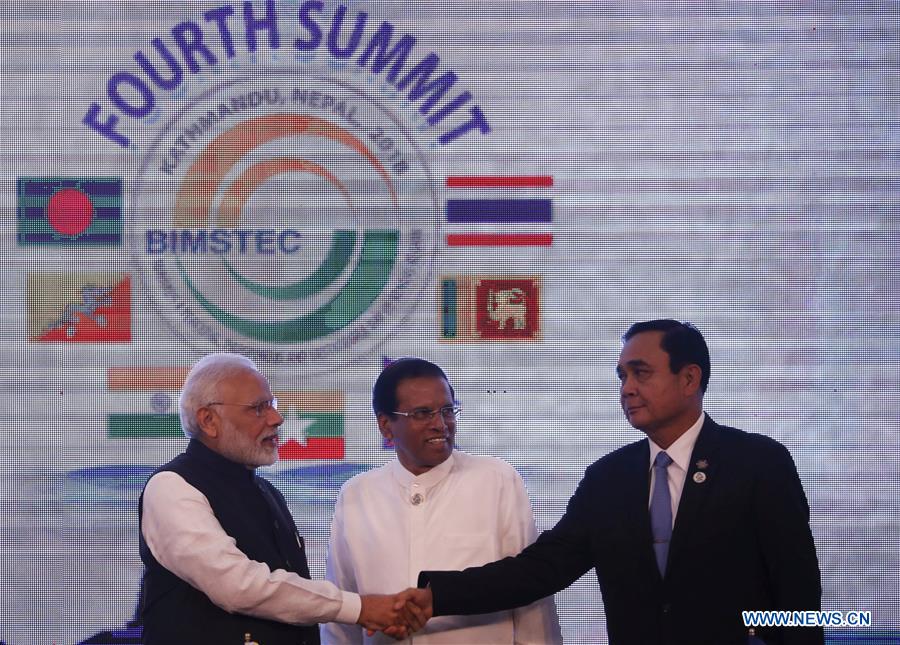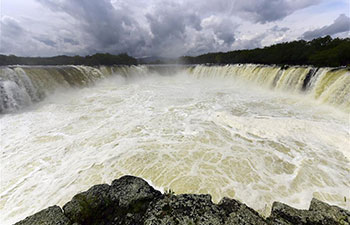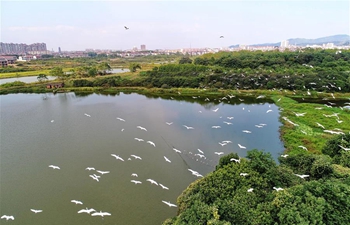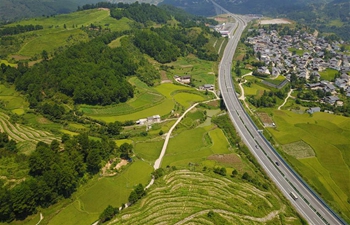
India's Prime Minister Narendra Modi (L) shakes hand with Thailand's Prime Minister Prayut Chan-o-cha (R) in the presence of Sri Lanka's President Maithripala Sirisena (C) during the opening session of the 4th Bay of Bengal Initiative for Multi-Sectoral Technical and Economic Cooperation (BIMSTEC) summit in Kathmandu, Nepal, Aug. 30, 2018. (Xinhua/Navesh Chitrakar)
KATHMANDU, Aug. 30 (Xinhua) -- The fourth summit of the Bay of Bengal Initiative for Multi-Sectoral Technical and Economic Cooperation (BIMSTEC) kicked off here on Thursday, with focus on promoting regional connectivity, energy, free trade and combating terrorism under the framework of the BIMSTEC.
Nepali Prime Minister K.P. Sharma Oli inaugurated the two-day summit amid a special function held at Hotel Soaltee Crowne Plaza in the capital with the presence of dignitaries from the BIMSTEC member states, senior government officials of the Nepali government and diplomats, among others.
Nepal is the rotating chair of the BIMSTEC, a regional group which comprises Bangladesh, India, Myanmar, Sri Lanka, Thailand, Bhutan and Nepal.
BIMSTEC region accounts for 22 percent of the global population, and has a combined gross domestic product of USD 2.8 trillion.
Of the seven BIMSTEC members, India, Bangladesh, Nepal, Bhutan, Bangladesh and Sri Lanka are from the South Asian region and Thailand and Myanmar are from the Southeast Asian region.
The summit is being held under the theme of "Towards a peaceful, prosperous and sustainable Bay of Bengal region" as an attempt to deepen economic, strategic, and political ties between countries of South Asia and South East Asia.
Delivering his opening remarks, the Nepali prime minister stressed on the importance of regional cooperation under the framework of BIMSTEC, saying that the world is facing simmering uncertainties in multilateralism.
"Nepal stands for meaningful regional cooperation. We believe that SAARC (South Asian Association for Regional Cooperation) and BIMSTEC do not substitute but complement each other. We are also committed to advancing the sub-regional cooperation under the BBIN (Bhutan, Bangladesh, India and Nepal)," he said while expressing Nepal's commitment to regionalism and multilateralism.
"We must collectively make a resolve to preserve and maintain multilateralism as the most legitimate process for addressing contemporary challenges of global scale. All States- bigger or smaller- must fulfill their responsibilities in good faith and ensure that the principles of fairness and justice are upheld," the prime minister said while chairing the inaugural session.
Giving emphasis on the deeper economic integration in the Bay of Bengal region, Prime Minister Oli said that better physical connectivity, increased trade, and enhanced people-to-people contacts will be instrumental to overcome the existing challenges including poverty, underdevelopment, and backwardness among others.
"Connectivity is a key enabler for robust regional cooperation. It is the very foundation, in which the edifice of economic integration can stand upright," he said adding that the BIMSTEC member states should intensify investment in the cross-regional transport networks such as connectivity of roads, railways, airways, waterways to unlock their full potential."
The leaders from the BIMSTEC member states vowed to enhance cooperation under the framework of the BIMSTEC in wide-ranging areas including railroad connectivity, combating terrorism and transnational crimes, free trade, railroad connectivity, agriculture, people-to-people contacts and tourism among others.
During the opening ceremony, leaders and officials from other member countries made the deliberation on
behalf of their respective countries, putting special focus on further deepening regional economic integration under the framework of the BIMSTEC.
The BIMSTEC leaders expressed commitment to defeating terrorism in all its forms and manifestations while reiterating to combat all other transnational organized crimes through an enhanced level of cooperation and coordinated efforts.
All the BIMSTEC leaders highlighted that peace and stability is essential for sustained economic growth and development in the Bay of Bengal region.
Ahead of the inaugural session of the fourth BIMSTEC summit, President Bidhya Devi Bhandari hosted a luncheon in honor of the visiting top foreign dignitaries, on Thursday afternoon.
On Friday, the BIMSTEC leaders will be attending a retreat session in Kathmandu to be followed by a concluding session.
At the end of the summit on Friday, the BIMSTEC member states will issue a Kathmandu Declaration containing the future direction of the regional grouping, according to the Nepali foreign ministry.
The BIMSTEC member countries are expected to announce a connectivity master plan and set up a BIMSTEC Development Fund at the end of the summit.
BIMSTEC member states will sign a Memorandum of Understanding on establishing the electricity grid interconnection during the summit on Friday.
Nepal will hand over the rotating chairmanship of the BIMSTEC to Sri Lanka during the summit.











